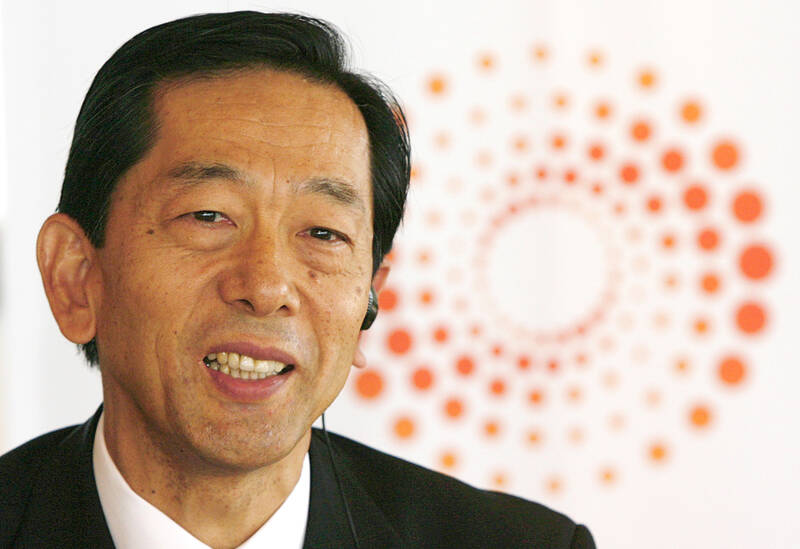Shuzo Sumi, former chairman of Japan’s Tokio Marine Holdings, Inc, is the new chairman of the Japan-Taiwan Exchange Association following the retirement of Mitsuo Ohashi, the Ministry of Foreign Affairs said yesterday.
In his inaugural address on Friday, Sumi praised his predecessor, Ohashi, for his significant contributions in strengthening Japan-Taiwan exchanges during his 14-year tenure, the association’s Web site said.
Sumi said that the Japan-Taiwan relationship is at it strongest, citing a survey conducted by the association in Taiwan last year, in which 76 percent of respondents selected Japan as their favorite country outside of Taiwan.

Photo: Reuters
Taiwanese travelers made more than 6.04 million visits to Japan last year, a new record, while Taiwan Semiconductor Manufacturing Co has made significant progress in its investment in Japan’s Kumamoto Prefecture, he said, adding that the two countries have made strides in addressing various shared issues.
Reflecting on his personal experiences, Sumi said that he and his family have enjoyed Taiwan’s rich nature and culture, and felt the warmth of Taiwanese toward Japan, which has strengthened his resolve to focus on enhancing Taiwan-Japan cooperation.
In related news, the ministry yesterday said that Member of the Japanese House of Representatives Takayuki Kobayashi, a former minister for economic security, is arriving in Taiwan today.
Kobayashi is to meet with President William Lai (賴清德), Legislative Speaker Han Kuo-yu (韓國瑜), National Security Council Secretary-General Joseph Wu (吳釗燮), Minister of Foreign Affairs Lin Chia-lung (林佳龍) and other senior government officials, Taiwan-Japan Relations Association Secretary-General Chang Jen-joe (張仁久) said.
Kobayashi, who ran in the Japanese Liberal Democratic Party’s presidential election last year, is viewed by many as a rising star in Japanese politics, Chang said.
Separately, asked about Taiwan’s representation at Hiroshima’s Aug. 6 peace memorial ceremony this year, Chang said that the Taipei Economic and Cultural Representative Office in Japan has received an invitation and is to send a high-ranking official to attend the event.

A small number of Taiwanese this year lost their citizenship rights after traveling in China and obtaining a one-time Chinese passport to cross the border into Russia, a source said today. The people signed up through Chinese travel agencies for tours of neighboring Russia with companies claiming they could obtain Russian visas and fast-track border clearance, the source said on condition of anonymity. The travelers were actually issued one-time-use Chinese passports, they said. Taiwanese are prohibited from holding a Chinese passport or household registration. If found to have a Chinese ID, they may lose their resident status under Article 9-1

Taiwanese were praised for their composure after a video filmed by Taiwanese tourists capturing the moment a magnitude 7.5 earthquake struck Japan’s Aomori Prefecture went viral on social media. The video shows a hotel room shaking violently amid Monday’s quake, with objects falling to the ground. Two Taiwanese began filming with their mobile phones, while two others held the sides of a TV to prevent it from falling. When the shaking stopped, the pair calmly took down the TV and laid it flat on a tatami mat, the video shows. The video also captured the group talking about the safety of their companions bathing

PROBLEMATIC APP: Citing more than 1,000 fraud cases, the government is taking the app down for a year, but opposition voices are calling it censorship Chinese Nationalist Party (KMT) Chairwoman Cheng Li-wun (鄭麗文) yesterday decried a government plan to suspend access to Chinese social media platform Xiaohongshu (小紅書) for one year as censorship, while the Presidential Office backed the plan. The Ministry of the Interior on Thursday cited security risks and accusations that the Instagram-like app, known as Rednote in English, had figured in more than 1,700 fraud cases since last year. The company, which has about 3 million users in Taiwan, has not yet responded to requests for comment. “Many people online are already asking ‘How to climb over the firewall to access Xiaohongshu,’” Cheng posted on

A classified Pentagon-produced, multiyear assessment — the Overmatch brief — highlighted unreported Chinese capabilities to destroy US military assets and identified US supply chain choke points, painting a disturbing picture of waning US military might, a New York Times editorial published on Monday said. US Secretary of Defense Pete Hegseth’s comments in November last year that “we lose every time” in Pentagon-conducted war games pitting the US against China further highlighted the uncertainty about the US’ capability to intervene in the event of a Chinese invasion of Taiwan. “It shows the Pentagon’s overreliance on expensive, vulnerable weapons as adversaries field cheap, technologically